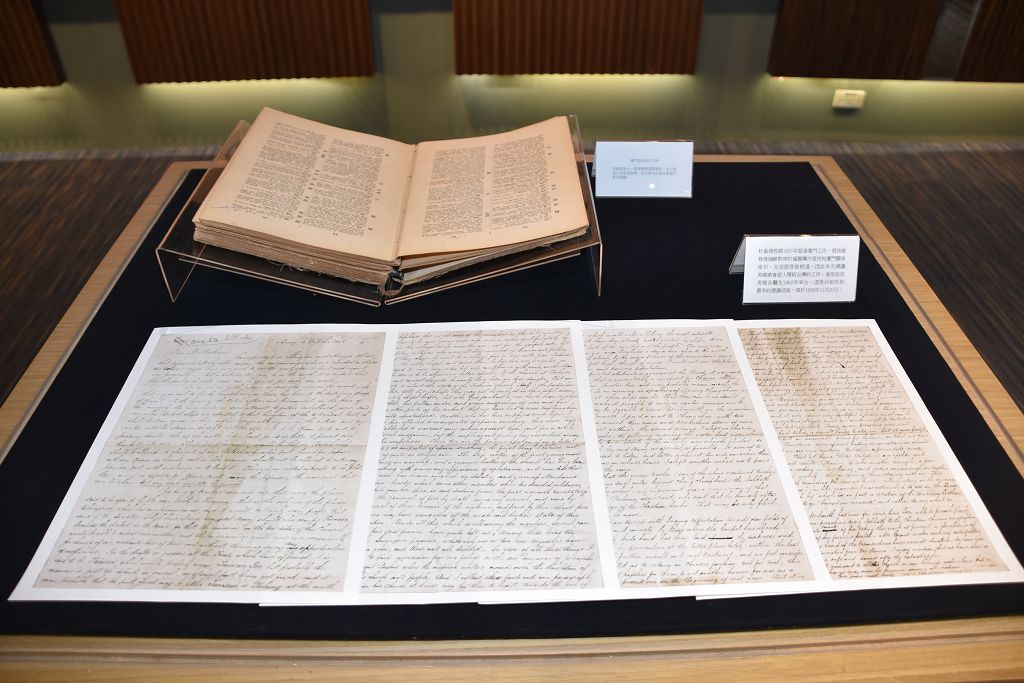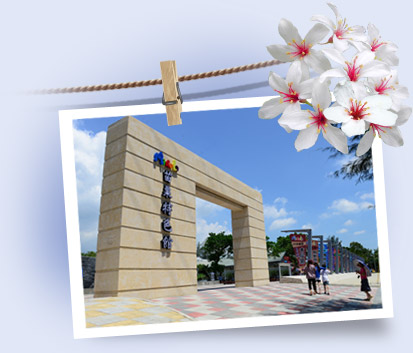Miscellaneous and Others
Taoyuan City Indigenous Culture Center
The Taoyuan City Government established and completed the “Taoyuan City Indigenous Culture Center” in May, 2004 to pass down the culture, preserve the assets, implement the assistance, enhance the caring, and improve the welfare of the indigenous peoples. The Center is a four-story building with a basement floor covering an area of 0.3 hectares. The basement floor is equipped with a stage for mass gatherings that can contain about 600 persons; the first floor has one curation room, one office, one VIP lounge, the hall and the service desk; the second floor has two curation rooms and one relic collection room, while the third and fourth floors include one conference room and three general classrooms. Various indigenous cultural exhibitions are mainly arranged on the first and second floor of the Center while the third and fourth floors mainly focus on space for educational training. The Center established Yuanling Artistic Dance as the resident dance group performing aboriginal dances to deepen the aboriginal image for visitors. The designing of the Center integrated images related to the totems, carvings, and weaving of each aboriginal tribe, and planned to set up facilities such as the activity center, relic collection room, exhibition room, general classroom, conference room, outdoor square, children playground, and parking lot. In the meantime, the Center provides multiple services such as skill training, gathering, art performance, and work exhibition that made it become an aboriginal cultivation, inheritance, and exchange center providing knowledge, art, and culture and leisure. Address: No. 101, Lane 29, Section 1, Yuanlin Road, Daxi District, Taoyuan City Opening Hours: Tuesday to Sunday 08:00 a.m. to 17:00 p.m. Closed on Monday (Free Admission; book a tour) Contact: Tel: (03)3895039, 3896322 Fax: (03)3895226 Traffic Information: 1. By Driving: Exit at the Daxi interchange of National Freeway No. 3 and drive in the direction of Daxi (Yuanlin Road) about five minutes to arrive. 2. By Bus: Take the Taoyuan Bus (routes between Taoyuan and Daxi, Taoyuan and Longtan, Longtan and Daxi) and get off at Qiding Station and walk about five minutes to arrive the Center.
 Changhua CountyHistory and humanitiesChanghua Christian Hospital Historical Museum
Changhua CountyHistory and humanitiesChanghua Christian Hospital Historical Museum Yilan CountyMiscellaneous and OthersWushi Harbor Ecology Station
Yilan CountyMiscellaneous and OthersWushi Harbor Ecology Station Miaoli CountyArts and CraftsMiaoli Ceramics MuseumIn the “Miaoli Ceramics Museum” you will find thousands of relic potteries and art works that represent the history, culture, and life style of Miaoli. The special pottery exhibition in the Museum includes: Hometown of Pottery - Miaoli, Old Pottery Artist With Experience Over 60 Years, Pottery of Miaoli, Wine Jar and Pottery Decoration, Kilns, Miaoli’s Pottery Manufacturing Technology, and Innovation in Traditional Pottery. The exhibitions show the ancient style, compatibility, and diverse development of the pottery and ceramics in Miaoli.
Miaoli CountyArts and CraftsMiaoli Ceramics MuseumIn the “Miaoli Ceramics Museum” you will find thousands of relic potteries and art works that represent the history, culture, and life style of Miaoli. The special pottery exhibition in the Museum includes: Hometown of Pottery - Miaoli, Old Pottery Artist With Experience Over 60 Years, Pottery of Miaoli, Wine Jar and Pottery Decoration, Kilns, Miaoli’s Pottery Manufacturing Technology, and Innovation in Traditional Pottery. The exhibitions show the ancient style, compatibility, and diverse development of the pottery and ceramics in Miaoli. Taoyuan CityMiscellaneous and OthersTaoyuan City Indigenous Culture CenterThe Taoyuan City Government established and completed the “Taoyuan City Indigenous Culture Center” in May, 2004 to pass down the culture, preserve the assets, implement the assistance, enhance the caring, and improve the welfare of the indigenous peoples. The Center is a four-story building with a basement floor covering an area of 0.3 hectares. The basement floor is equipped with a stage for mass gatherings that can contain about 600 persons; the first floor has one curation room, one office, one VIP lounge, the hall and the service desk; the second floor has two curation rooms and one relic collection room, while the third and fourth floors include one conference room and three general classrooms. Various indigenous cultural exhibitions are mainly arranged on the first and second floor of the Center while the third and fourth floors mainly focus on space for educational training. The Center established Yuanling Artistic Dance as the resident dance group performing aboriginal dances to deepen the aboriginal image for visitors. The designing of the Center integrated images related to the totems, carvings, and weaving of each aboriginal tribe, and planned to set up facilities such as the activity center, relic collection room, exhibition room, general classroom, conference room, outdoor square, children playground, and parking lot. In the meantime, the Center provides multiple services such as skill training, gathering, art performance, and work exhibition that made it become an aboriginal cultivation, inheritance, and exchange center providing knowledge, art, and culture and leisure. Address: No. 101, Lane 29, Section 1, Yuanlin Road, Daxi District, Taoyuan City Opening Hours: Tuesday to Sunday 08:00 a.m. to 17:00 p.m. Closed on Monday (Free Admission; book a tour) Contact: Tel: (03)3895039, 3896322 Fax: (03)3895226 Traffic Information: 1. By Driving: Exit at the Daxi interchange of National Freeway No. 3 and drive in the direction of Daxi (Yuanlin Road) about five minutes to arrive. 2. By Bus: Take the Taoyuan Bus (routes between Taoyuan and Daxi, Taoyuan and Longtan, Longtan and Daxi) and get off at Qiding Station and walk about five minutes to arrive the Center.
Taoyuan CityMiscellaneous and OthersTaoyuan City Indigenous Culture CenterThe Taoyuan City Government established and completed the “Taoyuan City Indigenous Culture Center” in May, 2004 to pass down the culture, preserve the assets, implement the assistance, enhance the caring, and improve the welfare of the indigenous peoples. The Center is a four-story building with a basement floor covering an area of 0.3 hectares. The basement floor is equipped with a stage for mass gatherings that can contain about 600 persons; the first floor has one curation room, one office, one VIP lounge, the hall and the service desk; the second floor has two curation rooms and one relic collection room, while the third and fourth floors include one conference room and three general classrooms. Various indigenous cultural exhibitions are mainly arranged on the first and second floor of the Center while the third and fourth floors mainly focus on space for educational training. The Center established Yuanling Artistic Dance as the resident dance group performing aboriginal dances to deepen the aboriginal image for visitors. The designing of the Center integrated images related to the totems, carvings, and weaving of each aboriginal tribe, and planned to set up facilities such as the activity center, relic collection room, exhibition room, general classroom, conference room, outdoor square, children playground, and parking lot. In the meantime, the Center provides multiple services such as skill training, gathering, art performance, and work exhibition that made it become an aboriginal cultivation, inheritance, and exchange center providing knowledge, art, and culture and leisure. Address: No. 101, Lane 29, Section 1, Yuanlin Road, Daxi District, Taoyuan City Opening Hours: Tuesday to Sunday 08:00 a.m. to 17:00 p.m. Closed on Monday (Free Admission; book a tour) Contact: Tel: (03)3895039, 3896322 Fax: (03)3895226 Traffic Information: 1. By Driving: Exit at the Daxi interchange of National Freeway No. 3 and drive in the direction of Daxi (Yuanlin Road) about five minutes to arrive. 2. By Bus: Take the Taoyuan Bus (routes between Taoyuan and Daxi, Taoyuan and Longtan, Longtan and Daxi) and get off at Qiding Station and walk about five minutes to arrive the Center.
 Museum Island
Museum Island